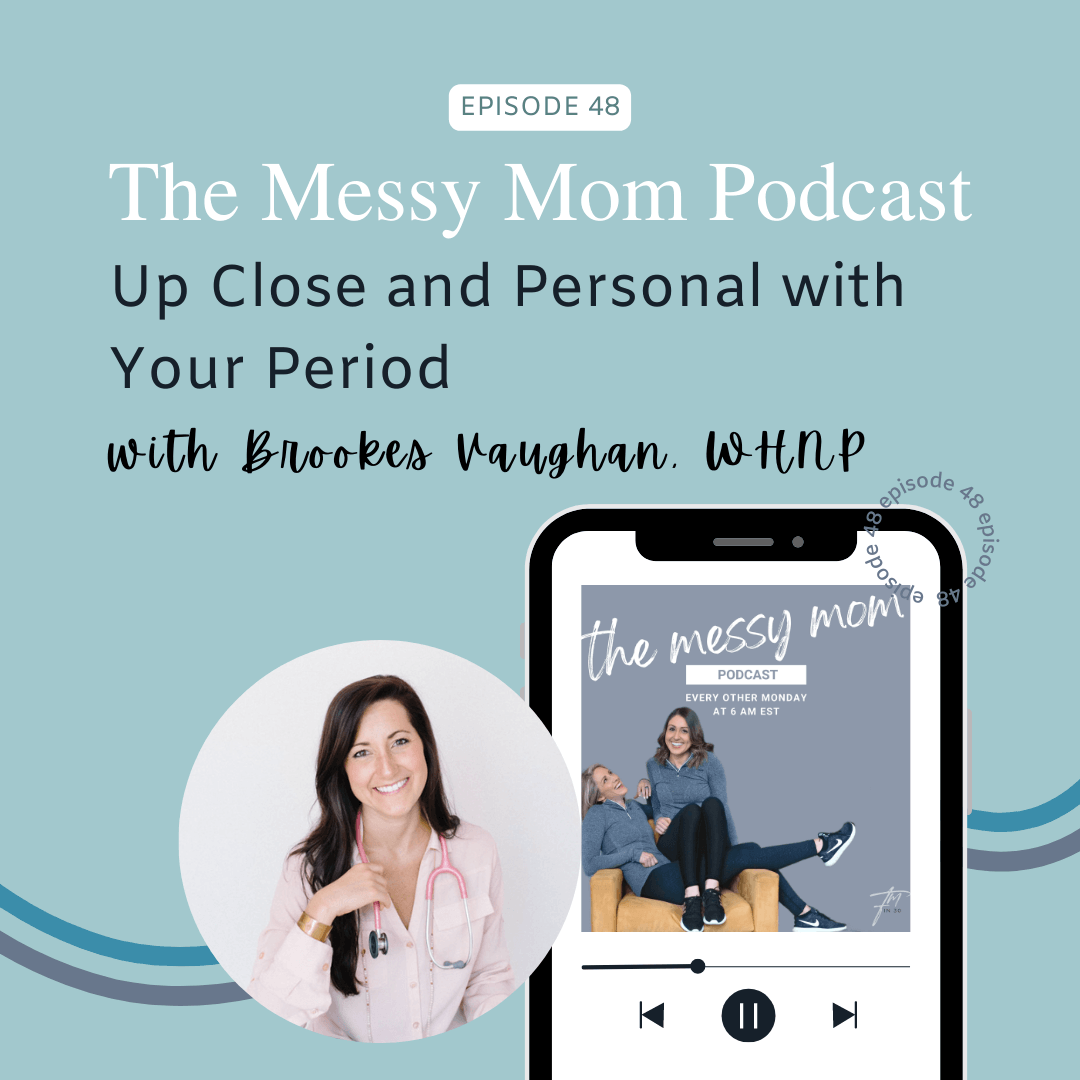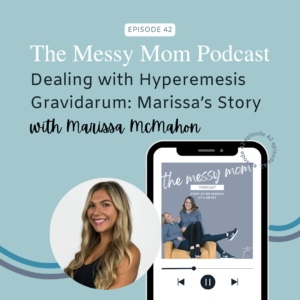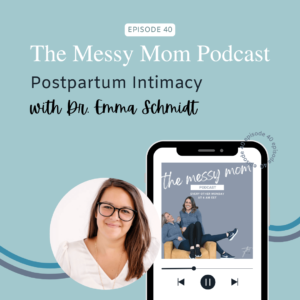CLICK PLAY TO LISTEN TO UP CLOSE AND PERSONAL WITH YOUR PERIOD:
Up Close and Personal with Your Period
This week on the Messy Mom Podcast, we had the pleasure of sitting down with an awesome guest, Brookes Vaughan, WHNP, a women’s health practitioner and founder of the Women’s Health Company. Who we think you’re going to love!
Brookes grew up in South Georgia and pursued her undergraduate degree at the University of Georgia before venturing to Nashville, Tennessee, to attend Vanderbilt. There, she earned her NP degree as a women’s health nurse practitioner. Afterward, she and her husband spent a few years in Charlotte before returning to Athens, where she worked at a small private practice. Now, she’s set to open her very own hormone health clinic just outside Athens. On top of all that, Brookes is a proud mama to a 1-and-a-half-year-old and a 4-year-old golden retriever!
During our conversation with Brookes, we will be talking about another topic that no one else seems to want to talk about and that is getting up close and personal with your period. We believe it’s important to talk about it, as every mom and every woman has gone through it.
This is a great conversation not just for us women tuning into this episode, but for the next generation, including our daughters, to help educate them to be more in tune with their bodies. Join us as we explore topics such as understanding the different phases of the menstrual cycle, recognizing the importance of each phase, addressing the lack of women’s health education around women’s health, and much more.
Understanding the Different Phases of the Menstrual Cycle
Getting right into today’s topic, Bailey starts by talking about how shocking it is that many women don’t know about their period, something that happens to them every month. Surprisingly, even Bailey herself didn’t know about it until she started having fertility challenges. This led us to the first question of discussing each of the different phases in the menstrual cycle and what occurs during each one.
Brookes finds this interesting because with the menstrual cycle, she tells her patients all the time, “It is a fifth vital sign because it is such an indicator of what is going on health-wise inside. Obviously, there are reasons why we may not be having a period. If you’re pregnant, breastfeeding, postmenopausal, or on hormonal birth control, those are reasons why you may not have a period that is pretty normal. Otherwise, we should be having a regular, monthly cycle and it can tell us a lot about what’s going on inside whether that’s we have a nutrient deficiency or thyroid disorder. It’s so interconnected.”
She continues, “The menstrual cycle is pretty much a very intricate dance between our brain, our ovaries, and our uterus. And our cycle has two phases. The first phase is called the follicular phase and that starts with cycle day one. And cycle day one is really the first full day of bleeding. It doesn’t mean heavy bleeding but it’s the first full day of needing at least a light pad or tampon. So I always tell patients, if you start spotting on a Thursday night but you require a pad or a tampon the next day, that’s considered cycle day one. Then the follicular phase ends with ovulation. So it starts with the first day of bleeding and it ends with ovulation.”
Symptoms and Changes During the Follicular Phase
Next, Brookes will walk us through hormonal changes along with some physical and emotional changes and symptoms that can happen.
She starts with the follicular phase explaining that on cycle day one the hormones are low. This includes estrogen, progesterone, luteinizing hormone, and follicle-stimulating hormone. These are hormones from the brain to stimulate the ovaries. Symptom-wise, the feeling of fatigue will come with hormones being low.
She says, “Estrogen is the dominant hormone of the follicular phase. So, slowly estrogen begins to rise during the follicular phase, and follicle-stimulating hormone from our brain, does exactly what it says it’s doing, it stimulates a follicle, which a follicle is basically an immature egg on the ovary. It stimulates an egg to mature, and we call that an ovarian follicle. And then right when that little follicle is mature, our brain sends a surge of something called luteinizing hormone that stimulates that follicle to release, and that’s ovulation.”
A side note that Brookes points out, “We don’t really make progesterone in the first part of our menstrual cycle. So, you will hear women say, ‘Oh, I had my estrogen and progesterone levels tested and I’m estrogen dominant.’ Well, it really depends on when the timing of that testing is. So, it can be very inaccurate. You are estrogen dominant in the first half of your menstrual cycle, which is very healthy and normal.”
So, early in the follicular phase, the symptoms can be low energy, cramps, mood fluctuations, and obviously bleeding. Then mid to late follicular phase, as that estrogen is rising and the brain is creating and sending out more follicle-stimulating hormone, a person can get a little bit of bloating and that’s caused by water retention because of estrogen rising.
Not only that, but with increased energy, comes increases athletic ability. So, as the estrogen levels are rising, a lot of women find that they feel their best, are more energized to exercise, have a happier mood, and increased libido or sex drive can occur during the late follicular phase.
The other thing Brookes mentions is cervical mucus changes. Cervical secretions change throughout the cycle and early in the follicular phase. In the early follicular phase, which occurs within the first three to five days after the period ends, cervical secretions and vaginal discharge tend to be dry. As estrogen levels rise in the mid-follicular phase, a white, cloudy, and kind of sticky discharge emerges. As we approach ovulation in the late follicular phase, the discharge becomes clear, stretchy, watery, and egg white-like, that’s usually an indicator that ovulation is coming. Following ovulation, the luteal phase begins when we have that LH surge, we ovulate, and it ends on cycle day one of the next period.
The Luteal Phase: Importance for Fertility and Pregnancy
Brookes lead us right into the next phase known as the luteal phase. What makes it interesting is the origin of its name. As the egg is released from the ovary, the follicle that opened now closes and forms a structure called the corpus luteum, resembling a yellow body on the ovary when viewed through a 3D ultrasound. This corpus luteum plays a vital role by producing progesterone, which rises during the luteal phase.
During this phase, one may notice the rising levels of progesterone. So, a lot of doctors, if they’re testing fertility or trying to confirm ovulation, they will check typically a progesterone level about seven-ish days after a woman ovulated to confirm ovulation.
While estrogen experiences a dip and then rises continually, it’s progesterone that takes center stage as the dominant hormone of the luteal phase and our melancholy hormone. As Brookes always says, “Natural progesterone that the ovaries make or that is bio-identical from an oral source or a medication source that is identical to what the ovaries make is really a natural anti-anxiety medication in a sense.” Not only that, but progesterone can also help us sleep. A lot of women notice that they get better sleep or deeper sleep right after ovulation. Sometimes progesterone, especially right before the period starts when it is high, women can start to notice more fatigue, some bloating and can slow our gut motility where a little bit of constipation can occur right before the period.
Brookes continues, “But what’s happening in our brain is, as the progesterone levels are rising, and as estrogen is stabilizing. The brain, if we conceive and an egg fertilizes, or if a sperm fertilizes an egg, then progesterone continues to rise. If it doesn’t, then the brain recognizes, ‘hey, conception hasn’t happened.’ Typically, a normal luteal phase is around 14 days. So around 14 days after we’ve ovulated, if we haven’t conceived, or gotten pregnant those hormones drop. Then the brain sends a signal back to the ovaries and the uterus and says, ‘okay, time to do it all over again’. That’s when the period starts to occur. PMS symptoms can come prior to the period. But the luteal phase is a really important phase for fertility.”
Progesterone is the hormone of pregnancy. So, we want progesterone to be increasing. Some studies have shown that it does kind of produce in a pulsatile manner, but still, she find that progesterone should be above three to confirm ovulation. Then ideally a lot of fertility specialists like for it to be 10 or higher.
Lack of Education on Women’s Health
Cari had learned more so far in this episode than she has her entire life as a woman. So, that sparked her next question for Brookes which is, why is this not taught because you either spend your time trying not to get pregnant and then when you do want to get pregnant, you have no clue where to start because no one’s talked about it.
Brookes doesn’t know either. She was just thinking about this and she doesn’t know why this isn’t in the curriculum in health classes at all because it is scientific. It is important for women and for girls to understand what’s going on in their bodies. Puberty can be a very traumatizing time for some women with all the big changes in our bodies. So, having an understanding of what’s going on really can normalize things.
Something she tells a lot of college students is, “Knowing what is normal helps you. It normalizes what’s normal, but it also helps you realize and recognize when something is off so that you can be proactive to get to the bottom of it.”
She hopes that one day this is going to be the curriculum and in general health classes because once you go to college unless you’re majoring in some kind of health major, you’re not going to talk about it again.
Note: if you’re a parent seeking a valuable resource to navigate difficult conversations about bodies with your kids, check out Birds and the Bees to help you equip your kids moving forward.
Benefits of Social Media
Bringing us to our next point, when we first started our period it was a private thing that you didn’t just tell anybody. However, it’s very comforting and helpful when you have an idea of what’s going on, when you know what’s normal and what’s not.
Bailey feels like this is one of the things that social media is bringing more to light with professionals like Brookes, is being able to get information from a professional source. Of course, there are still going to be people that aren’t qualified to talk about it but just remember to make sure you are getting your information from a professional source.
We didn’t get that growing up, we just learned exactly what our teachers told us. Bailey thinks it would have been great to have a woman’s health nurse practitioner come in and talk about it.
So, that is an area that social media is doing well if you’re getting your information from the right source.
Advice for Women Trying to Conceive and Trying Not to Conceive
We’ve talked a lot about what different phases are in your menstrual cycle, your cycle, and just your period as a whole. And obviously, a big part of fertility is your menstrual cycle. Now, shifting our focus to those trying to conceive or seeking alternatives to birth control, we turn to Brookes for her expert advice. For women who are new to the journey of wanting to get pregnant, what guidance does she offer based on their cycle? And then on the flip side of that, for those who prefer non-medicated approaches or doesn’t want to be on birth control, what alternatives can they explore?
Brookes loves the season of trying to conceive. Yes, it can be very stressful and very hard but she thinks if you have some tools in your toolbox to know what’s going on and to know when it’s really time to actually go and see your provider that can help.
If you are trying to conceive, a few things she would recommend are:
- Start tracking your cycles. There are great apps out there, like Flo which is a free and easy app to track your cycle. It’s really important to start to see how regular and consistent your cycles are because consistency is key for fertility. Your periods need to be consistently consistent. She loves for periods to be within three to five days in length apart each month. So for example, 28 days, and then the next cycle could be 31 days, and then the next could be 29, and the next could be 33. That’s pretty typical.
- Track ovulation symptoms. Are you noticing that cervical discharge is changing? Are you noticing an egg white-like discharge or any cramping on one side? That’s usually a common sign of ovulation.
- A lot of women like to test their basal body temperature. That is not great for telling you when you’re going to ovulate. It tells you after the fact. So Brookes would say that it’s never a bad idea to try that for a few months just to see if your temperature rises after ovulating. That’s a good sign that progesterone is increasing as it should be.
- There are ovulation predictor kits as well. She usually recommends starting around cycle day 7 or 8 and in the afternoons after lunch because it gives the LH time to reach your urine.
- Body as healthy as we possible can. This is her primary recommendation even prior to trying to get pregnant. So, the main things to do are…
- Optimizing our nutrition. Look at and focus on diet. For her, she sees a lot of times women need more protein or fiber.
- Fitness and exercise. The benefits of exercise, especially if you start exercising before you get pregnant so that you can just maintain that regimen throughout pregnancy. You do have to modify to protect your pelvic floor muscles but starting and being consistent with an exercise regimen the benefits are astronomical not only to your blood sugar regulation but to the baby’s development, stamina during labor, and pregnant labor outcomes are so much better.
- Supplementation. A lot of women can get what they need in their diet, but a prenatal vitamin is a good insurance. It helps fill in the gaps in the typical American diet, especially when it comes to folate and even sometimes iron. Brookes always tell her patients, “If you were sexually active, I would just take a prenatal vitamin instead of a multivitamin, but especially three months prior to starting to try to get pregnant.”
- Blood work. This helps to get an idea if you are deficient in anything. Similar to popping the hood on a car where you can look at what’s going on underneath. So, take a look what does your blood sugar look like prior to pregnancy. As well as your thyroid levels prior to and during pregnancy because normal for the lab and normal for the rest of the world is not normal for pregnancy or fertility. The normal lab values are .45 to 4.5 but in pregnancy, we want it to be under 3 and ideally under 2.5 which is a big difference from what the world considers normal.
- You can also test to see if you’re immune to things like rubella, varicella, those sorts of things that we don’t want to get when we’re pregnant.
- There are also preconception carrier tests that women can have done to see if they’re a carrier for an autosomal recessive trait, like Cystic Fibrosis.
For the second part of the question, for women who just don’t want to be on birth control but aren’t trying to get pregnant she would say the same things. Brookes recommends tracking your cycle to see what it’s doing and monitoring your symptoms.
If you have debilitating symptoms like debilitating PMS and you’re having to pop ibuprofen every single day, multiple times a day when you’re on you’re period and you’re bleeding heavily, notify your doctor and see if you can get to the bottom of it.
Another side note: What is considered heavy bleeding is whatever a person says is heavy. It used to be that was quantified as more than a pad an hour which was considered heavy. But now it’s based on what the patient says and perceives as heavy.
Natural planning can actually be very effective as birth control if done well and if your cycles are regular. If your periods are inconsistently consistent, you can’t really do it because it’s harder to know when you’re fertile. If you are having regular consistent cycles, you are only fertile for about a 6-day period each month and the reason that is, is sperm can live for up to six days in the female reproductive tract. An egg only lives for 24 to 48 hours once it’s released, but you can have sex six days prior to ovulation and not have sex at all between that six-day ovulation, and you can still get pregnant even though you didn’t have sex on the day of ovulation.
But there are some great ways to track that. There are several natural family planning apps but the one Brookes suggested is Daysy. These can be really good at helping you track your cycles and helping you kind of pinpoint when that fertile window is.
The Women’s Health Company
We love Brookes’s approach and found that was a great segway into her company. We think what she is doing is amazing, so we wanted to make sure to ask her to tell us a little bit more about the Women’s Health Company including what she does and when she’s going to open.
Brookes points out that it was birthed as an outlet and her hobby for a few years prior to and during COVID, just to educate. Her goal was to educate, equip and encourage women to live healthy, whole, and holy lives. So on Instagram, she just talks about a mixture of hormone health which encompasses so many things.
It encompasses nutrition, our physical health, and our sleep. So, they talk a lot about that. Then a lot about being a mom and faith.
Then, there is the Women’s Health Company Clinic which is what she is opening up here in July in Georgia. And that really came from her struggles as a health care provider and not being able to provide the type of care that she really wanted for her patients. She previously was in big practice, what she calls corporate health care. There is nothing wrong with that, we need it and it saves lives. But there’s also a place for individualized health care where you’re able to really sit down with patients and really listen and have the time, if you only have 10 minutes, which is what she used to have with patients, you don’t have time to do anything really.
So it was kind of birthed out of that desire to really sit down with patients and get to the root cause of what’s going on with whatever it looks like hormonally.
She is going to be seeing patients in person and virtually
- For anyone in Georgia – she is able to diagnose, prescribe, treat, and order blood work.
- For patients outside of Georgia – she is able to see on a coaching basis. So, she can’t diagnose, prescribe and order blood work, but she can still really sit down, listen and hear what’s going on and help them create a plan of care that is a sustainable one for balancing their hormones.
We want to thank Brookes again for taking the time to chat with us. This is only the beginning of our conversation on getting up close and personal with your period with Brookes Vaughan, WHNP. Listen to the full episode wherever you listen to your podcasts.
Resources mentioned:
- Birds and the Bees
- Flo App
- Daysy App
- If you want to learn more from Brookes Vaughan, WHNP you can find her on Instagram @thewomenshealthcompany. Or you can also reach her on her website: https://thewomenshealthcompany.com/
- Find us over on Instagram @fitmamain30
- Try any of our Fit Mama in 30 programs completely free for seven days. And if you decide you want to stick with us after the seven days, you can get $10 off your membership with the code PODCAST at checkout.
This information is meant for educational and informational purposes only. You should not use this information to diagnose or treat any health problems without consulting your personal medical practitioner. Always seek the advice of your own medical practitioner about your specific health concerns and needs.





